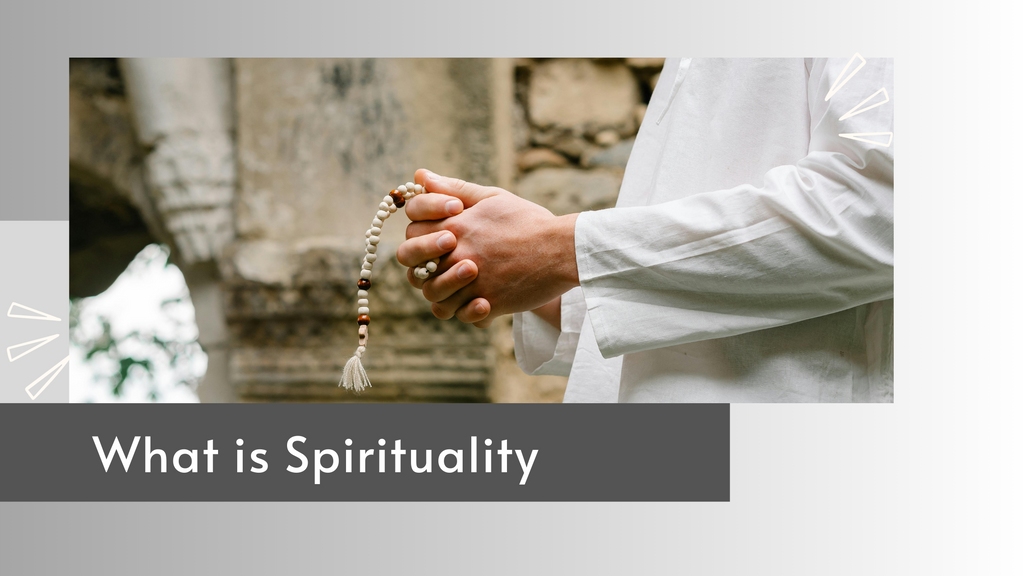In the midst of our fast-paced modern lives, many of us find ourselves yearning for a deeper connection, a connection with our true selves, with the divine, and with the sacred mysteries of existence.
This longing often manifests as a desire to embark on a spiritual journey, a path that promises inner peace, self-realization, and a heightened sense of purpose.
While the journey towards spiritual growth can seem daunting, especially for those new to spirituality, the Yogic way of life provides a time-tested framework to begin this transformative process. In this blog, we will explore the essential elements one must understand to initiate their spiritual journey through the lens of ancient philosophy and traditions.
What is Spirituality?

A person's connection to something bigger than themselves can be achieved through a variety of beliefs, practices, and experiences that are collectively referred to as spirituality. It is an introspective investigation of life's more profound mysteries, a search for purpose, and a path to self-realization. People from all areas of life can embrace spirituality, regardless of their cultural or religious background, as it transcends religious barriers.
Dharma, in Spirituality, specifically refers to the individual's journey towards Self-realization, enlightenment, and ultimately, liberation (moksha) from the cycle of birth and death. It is a profound exploration of the true nature of existence, the relationship between the individual soul (Atman) and the universal consciousness (Brahman), and the pursuit of spiritual knowledge and practices that lead to inner peace, self-understanding, and unity with the divine.
Your Spiritual Journey Through the Lens of Yoga Tradition: Where to Start?

The spiritual journey, or the pursuit of Self-realization and inner awakening, holds a sacred place in the Yoga Tradition. Yoga offers a rich tapestry of teachings, practices, and paths that can guide you towards a deeper understanding of yourself and ultimate reality.
At the heart of the spiritual tradition of Yoga lies the concept of Moksha or liberation – the liberation from the cycle of birth, death, and rebirth, and the attainment of oneness with the Divine. This journey is a profoundly personal and a transformative experience, and it is crucial to approach it with an open mind, humility, and a genuine desire to learn and grow.
One of the fundamental starting points in the Yoga Tradition is the exploration of ancient scriptures, such as the Vedas, the Upanishads, and the Bhagavad Gita. These sacred texts offer profound insights into the nature of existence, the workings of the mind and consciousness, and the paths to spiritual liberation. Reading, contemplating, and discussing these texts with a qualified teacher, within a spiritual community lays a solid foundation for one's spiritual journey.
Another essential aspect of the Yoga spiritual tradition is the practice of yoga. Yoga is not merely a physical exercise but a holistic system that encompasses various techniques for achieving harmony between the body, mind, and soul. The practice of asanas (physical postures), pranayama (breath control), meditation, and the study of yogic philosophy can help cultivate self-awareness, discipline, and inner peace – essential prerequisites for spiritual growth.
Adopting a lifestyle aligned with the principles of Dharma (righteous conduct) and cultivating virtues such as non-violence (ahimsa), truthfulness (satya), non-stealing (asteya), and purity (brahmacharya) also serve as a powerful catalyst for spiritual progress. These ethical principles help purify the mind and create a conducive environment for spiritual practices to take root and flourish.
It is important to remember that the spiritual journey is a deeply personal one, and each individual may resonate with different aspects of the Yoga Tradition. Some may find solace in the devotional paths of bhakti, where the focus is on cultivating love and devotion towards the Divine through prayers, chanting, and worship. Others may be drawn to the path of knowledge (jnana yoga), where the emphasis is on the pursuit of wisdom and self-inquiry through study and contemplation.
Ultimately, the Yoga spiritual tradition encourages seekers to approach their journey with an open mind, a willingness to experiment, and a commitment to self-reflection and self-discovery. It is a lifelong process of unfolding and unveiling the inherent divine nature within each individual, and the rewards of this journey are profound – a sense of inner peace, clarity, and a deeper connection with the sacred.
Books on Spirituality
One of the most accessible ways to deepen your understanding of spirituality is through books. The Yogic tradition has produced a wealth of literature on spirituality, ranging from ancient texts like the Upanishads and the Bhagavad Gita to modern interpretations by renowned spiritual leaders.
Books like "The Autobiography of a Yogi" by Paramahansa Yogananda, "The Seven Spiritual Laws of Success" by Deepak Chopra, and "The Power of Now" by Eckhart Tolle offer valuable insights and practical guidance for those seeking spiritual growth.
The Significance of Ancient Yogic Texts
The ancient Yogic texts are not merely historical records; they are living guides that continue to inspire and guide spiritual seekers even today. These texts offer insights into the human condition and provide practical guidance on how to navigate the complexities of life with wisdom and equanimity.
The ancient Yogic teachings, such as the Upanishads and the Bhagavad Gita, are treasure troves of spiritual wisdom. These sacred texts explore concepts like the nature of the self, the cycle of rebirth, and the path to liberation (moksha). The ancient seers, or rishis, emphasized the importance of self-inquiry, meditation, and the pursuit of knowledge as means to attain spiritual enlightenment.
Finding a Guru
In the ancient Yogic tradition, a guru (spiritual teacher) is often considered an invaluable guide on the spiritual journey. A guru is someone who has walked the path before and can offer wisdom, guidance, and support to the seeker. Finding a guru is a personal choice, and it is essential to resonate with their teachings and approach.
However, it is important to approach this relationship with discernment and caution, as not all who claim to be gurus are genuine or trustworthy. Trust your intuition, and be wary of those who demand blind obedience or make unreasonable demands.
Center Spiritual Awareness
As you progress on your spiritual journey, it is important to cultivate spiritual awareness – a state of heightened consciousness and mindfulness. This can be achieved through practices like meditation, contemplation, and mindfulness exercises. By centering spiritual awareness, you become more attuned to the present moment, developing a deeper appreciation for life's beauty and complexity.
Conclusion
As you start your spiritual journey, remember that the path is one of self-discovery, discipline, and profound transformation. The ancient Spiritual texts, such as the Vedas, Upanishads, and the Bhagavad Gita, offer timeless wisdom and guidance to help you navigate this sacred path. Embrace the practices of meditation, yoga, devotion, and selfless service, as they purify the mind and bring you closer to realizing your true nature and connection with the Divine. Seek the guidance of a trusted guru or spiritual teacher, for they can provide invaluable insights and support along your journey. However, approach this relationship with discernment, trusting your intuition to find a genuine and trustworthy guide.
FAQ
What is the first step in a spiritual journey?
The first step in a spiritual journey is often self-reflection and a willingness to explore the deeper questions of life. It involves examining your beliefs, values, and the motivations that drive your actions.
How do I find my spiritual path?
Finding your spiritual path is a personal journey that requires an open mind and a willingness to explore different practices and traditions. Experiment with various practices, such as meditation, yoga, or mindfulness, and find what resonates with you.
How do I go on a spiritual journey?
Going on a spiritual journey involves a commitment to self-discovery, introspection, and personal growth. It may involve studying spiritual texts, engaging in spiritual practices, seeking guidance from a guru or mentor, and cultivating spiritual awareness.
How do I start a spiritual healing journey?
Starting a spiritual healing journey often begins with acknowledging the areas of your life where you feel disconnected, stuck, or in need of healing. It involves embracing practices that promote self-care, self-compassion, and a deeper connection with your inner self.
How do I become more spiritually aware?
To become more spiritually aware, incorporate practices like meditation, mindfulness exercises, and contemplation into your daily routine. These practices help cultivate a heightened state of consciousness and awareness, allowing you to be more present and attuned to the world around you.


